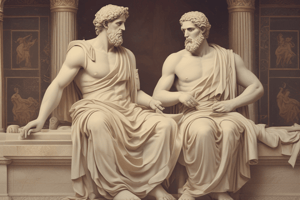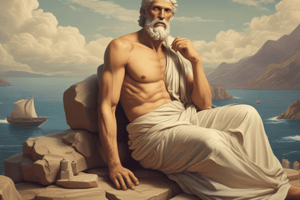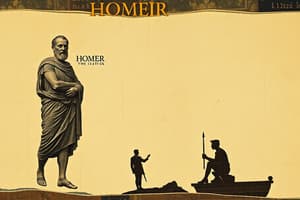Podcast
Questions and Answers
How did the transmission of poets' works primarily occur during the Archaic Age?
How did the transmission of poets' works primarily occur during the Archaic Age?
- Through spoken word and oral communication. (correct)
- Through dramatic performances in theaters.
- Through the development of printing presses.
- Through written scrolls and formal education.
Which of the following best describes the relationship between the Greek Dark Ages, the Archaic Age, and the Classical Age?
Which of the following best describes the relationship between the Greek Dark Ages, the Archaic Age, and the Classical Age?
- The Classical Age preceded the Greek Dark Ages, which in turn preceded the Archaic Age.
- The Archaic Age was a period of decline that followed the Classical Age and the Greek Dark Ages.
- The Greek Dark Ages preceded the Archaic Age, which then preceded the Classical Age. (correct)
- All three ages occurred simultaneously, representing different aspects of Greek society.
How did the focus of literature shift from the Archaic to the Classical period in ancient Greece?
How did the focus of literature shift from the Archaic to the Classical period in ancient Greece?
- From human-centered stories to mythological themes.
- From mythical elements in the Archaic period to human-centered stories in the Classical period. (correct)
- From personal themes to a focus on public life.
- From philosophical debates about truth and morality to heroic adventures.
What role did Athens play during the Classical Age of Greek literature?
What role did Athens play during the Classical Age of Greek literature?
Which themes were commonly explored in the literary works of the Archaic Age?
Which themes were commonly explored in the literary works of the Archaic Age?
What characterizes the Hellenistic Age in terms of the geographical spread of Greek culture and literature?
What characterizes the Hellenistic Age in terms of the geographical spread of Greek culture and literature?
How does the focus of literary themes change from the Classical to the Hellenistic period?
How does the focus of literary themes change from the Classical to the Hellenistic period?
What is a key feature that distinguishes Hellenistic literature from that of the Classical or Archaic periods?
What is a key feature that distinguishes Hellenistic literature from that of the Classical or Archaic periods?
Which genre gained prominence during the Classical Age, marking a significant shift from the types of literature in the Archaic Age?
Which genre gained prominence during the Classical Age, marking a significant shift from the types of literature in the Archaic Age?
How did the works of Euripides contribute to the evolution of Greek tragedy during the Classical Age?
How did the works of Euripides contribute to the evolution of Greek tragedy during the Classical Age?
What distinguishes the comedies of Aristophanes from other forms of Greek drama during the Classical Age?
What distinguishes the comedies of Aristophanes from other forms of Greek drama during the Classical Age?
How did the conquest of Alexander the Great influence the Hellenistic Age?
How did the conquest of Alexander the Great influence the Hellenistic Age?
How did the role of Alexandria in Egypt contribute to the development of literature during the Hellenistic Age?
How did the role of Alexandria in Egypt contribute to the development of literature during the Hellenistic Age?
Which characteristic is most associated with plays in the Classic Age?
Which characteristic is most associated with plays in the Classic Age?
What is the core theme explored in Homer's Iliad?
What is the core theme explored in Homer's Iliad?
What did Aristotle contribute to the field of literary criticism?
What did Aristotle contribute to the field of literary criticism?
What primary subject matter does Hesiod explore in "Theogony"?
What primary subject matter does Hesiod explore in "Theogony"?
What is Sappho best known for in the context of Greek literature?
What is Sappho best known for in the context of Greek literature?
What is Plato's contribution to classic Greek literature?
What is Plato's contribution to classic Greek literature?
What kind of works were associated with Aesop in Greek literature?
What kind of works were associated with Aesop in Greek literature?
Flashcards
What is the Archaic Age?
What is the Archaic Age?
A period in ancient Greek history and literature from the end of the Greek Dark Ages to the beginning of the Classical Age, marked by significant cultural and political transformation.
Transmission of Archaic Age Literature?
Transmission of Archaic Age Literature?
Poets' works during Archaic Age were communicated orally.
Who were the famous poets of the Archaic Age?
Who were the famous poets of the Archaic Age?
Homer (Iliad and Odyssey) and Hesiod (The Theogony).
What were the main themes of the Archaic Age?
What were the main themes of the Archaic Age?
Signup and view all the flashcards
Who was Homer?
Who was Homer?
Signup and view all the flashcards
What is the Iliad?
What is the Iliad?
Signup and view all the flashcards
What is the Odyssey?
What is the Odyssey?
Signup and view all the flashcards
What is the Theogony?
What is the Theogony?
Signup and view all the flashcards
What is the Classical Age?
What is the Classical Age?
Signup and view all the flashcards
What were the major genres of the Classical Age?
What were the major genres of the Classical Age?
Signup and view all the flashcards
Who was Aeschylus?
Who was Aeschylus?
Signup and view all the flashcards
What type of works did Sophocles create?
What type of works did Sophocles create?
Signup and view all the flashcards
Who was Euripides?
Who was Euripides?
Signup and view all the flashcards
What is Plato's 'The Republic' about?
What is Plato's 'The Republic' about?
Signup and view all the flashcards
What is Aristotle's 'Poetics'?
What is Aristotle's 'Poetics'?
Signup and view all the flashcards
When did the Hellenistic Age begin?
When did the Hellenistic Age begin?
Signup and view all the flashcards
What was the focus of Hellenistic Age literature?
What was the focus of Hellenistic Age literature?
Signup and view all the flashcards
What was emphasized during the Hellenistic Age?
What was emphasized during the Hellenistic Age?
Signup and view all the flashcards
What type of poems were used during the Hellenistic age?
What type of poems were used during the Hellenistic age?
Signup and view all the flashcards
What city does literature move to during the Hellenistic Age?
What city does literature move to during the Hellenistic Age?
Signup and view all the flashcards
Study Notes
- Greek Literature has three periods
- Archaic: Until the end of the 6th century BC
- Classical: 5th and 4th centuries BC
- Hellenistic: 3rd century BC onward
Archaic Age
- Ancient Greek history and literature mark this period
- A time of transformation for Greek civilization
- Followed the Greek Dark Ages
- The Greek Dark ages were a period of decline after the fall of the Mycenaean civilization
- Classical Age followed, with figures like Socrates and Plato
- Myth was the core feature
- It incorporated history and folklore
- Poets' works were communicated orally
- Famous poets included Homer (Iliad and Odyssey) and Hesiod (The Theogony)
- Common themes included heroism, divine intervention, fate, honor, and morality
- Formed the foundation of later Greek literature and Western Literary Tradition
Significant Examples of Literary Work During Archaic Age
- Homer is known as the "Father of Western Literature"
- His works include the Iliad and Odyssey
- The Iliad is a poem of contrasts
- Gods and mortals, divine and human, as well as war and peace
- The Odyssey is a ten-year odyssey
- A Ten year odyssey about The Trojan War hero Odysseus' attempt to return home
- Hesiod was a near-contemporary of Homer, but with a different focus
- His work includes the Theogony The Theogony is account of the creation of the universe and the generations of the Gods.
- Aesop created short allegorical collections of fables
- Sappho was a female lyric poet
- Known as the 10th muse
- Wrote hymns to the Gods
Classical Age
- The golden age of Greek literature and culture
- A shift from mythological to more human-centered stories
- Major genres of the time included tragedy, comedy, history, philosophy, and rhetoric
- Athens became a cultural center during the Age of Pericles
- Oral recitation of poetry and drama began during this time
- The golden age of rhetoric and oratory led to questions of truth and morality
Greek Writers of the Classic Age
- Aeschylus created the tragic drama
- His themes were focussed on God and Divinity/Divine beings
- Sophocles wrote tragedy
- His common themes were Religions and moral issues
- Euripides wrote tragedy
- Used themes such as Skeptical enlightenment and doubts about the traditional picture of the Gods
- Known for psychological depth and challenging norms
- Medea is about a woman who takes revenge on her unfaithful husband
- Aristophanes
- Greatest comedic poet
- The most famous comic playwright
- Plays were often satirical and political
- Plato
- Works focused on Culture, ethics, metaphysics, and politics (Humankind’s highest study). which became the basis of Western Philosophy
- Used dialogues to explore justice, truth, beauty, and politics
- The Republic discusses the ideal state and the philosopher-king
- Aristotle expanded on Physics, natural history, psychology, and literary criticism
- Wrote on logic, science, ethics, and literary theory
- Poetics is the first literary criticism text, analyzing tragedy and epic poetry
Hellenistic Age
- Began after Alexander the Great's conquests
- Alexander Died in 323 BC
- Greek culture and language spread across the Mediterranean and Near East
- There was a Focus shift from public life to personal themes
- Themes included love, individuality, and private emotions
- The literary center moved from Athens to Alexandria in Egypt
- Prosperity and progress in the arts, literature, theater, architecture, music, mathematics, science, and philosophy
- The new comedy and Alexanderian comedy were born
- Greek literature was pure and unaffected by other cultures
Key features of Hellenistic Age
- Emphasis on scholarship, library culture, and literary refinement
- Utilized pastoral poetry, elegies, and shorter, more polished poems
- Literature became more learned, allusive, and elitist
Studying That Suits You
Use AI to generate personalized quizzes and flashcards to suit your learning preferences.




